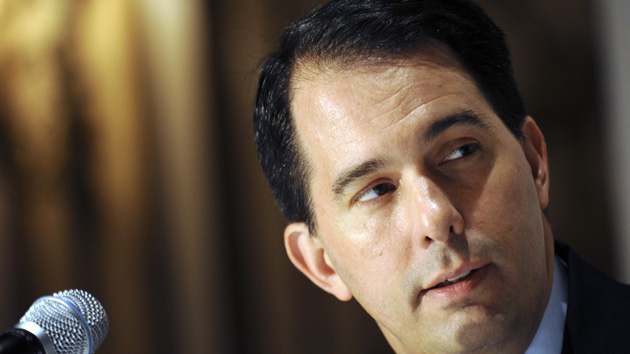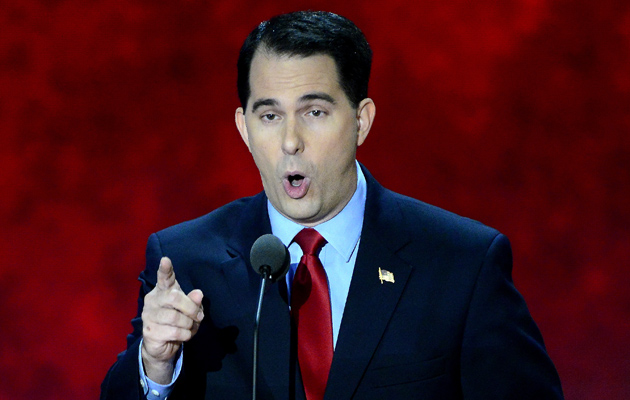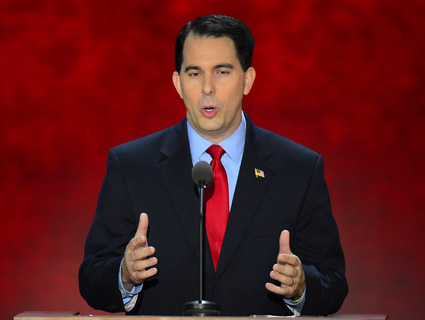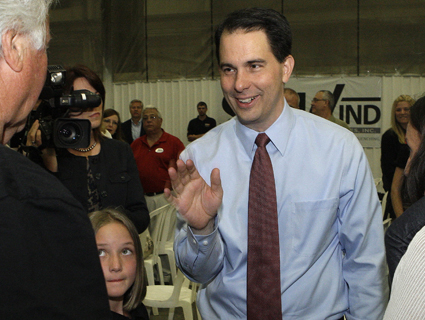
Future-Image/ZUMAPRESS.com
On Thursday, a federal judge unsealed a batch of documents shedding light on a secret investigation that has dogged Wisconsin Gov. Scott Walker and some of his conservative allies since the summer of 2012.
Prosecutors are probing whether Walker and two of his aides illegally coordinated with outside groups—including the Koch-backed Americans for Prosperity—to fend off a wave of recall elections in 2011 and 2012. This kind of probe, conducted in secret, is known in Wisconsin as a “John Doe.” It is spearheaded by Francis Schmitz, a former federal prosecutor who was on George W. Bush’s shortlist to be US attorney in Wisconsin’s Eastern District. The investigation was initiated by the Milwaukee County district attorney’s office, which is led by Democrats.
Here are four key takeaways from the newly released documents:
1) Walker and two aides allegedly ran a “criminal scheme”
Prosecutors allege in the documents that Walker, his campaign committee, and two close aides, RJ Johnson and Deborah Jordahl, ran a “criminal scheme” using dark-money nonprofit groups to evade state election laws. Their goal: Defend Walker and a group of state lawmakers facing recall elections in 2011 and ’12.
The documents describe a web of 12 nonprofit groups that closely coordinated their fundraising and spending. Prosecutors say Walker, Johnson, and Jordahl presided over this web of groups. The documents quote a May 2011 email sent by Walker to GOP operative Karl Rove about the coordination plans: “Bottom-line: RJ [Johnson] helps keep in place a team that is wildly successful in Wisconsin. We are running 9 recall elections and it will be like 9 congressional markets in every market in the state (and Twin Cities).”
In a statement, Walker said: “The accusation of any wrongdoing written in the complaint by the office of a partisan Democrat district attorney by me or by my campaign is categorically false. This is nothing more than a partisan investigation with no basis in state law.”
2) A conservative leader voiced concerns about coordination between outside groups and Walker
The documents show that the Wisconsin Club for Growth acted as a conduit for funneling dark money to pro-Walker and pro-GOP groups. It also ran its own ads defending Walker and his policy agenda, which included a controversial budget-repair bill that limited bargaining rights for public-sector workers.
Wisconsin Club for Growth’s activities had at least one conservative leader worried. “Notably, prior to the 2011 Wisconsin Senate recall elections, the national Club for Growth organization raised concerns about coordination or interaction with [Wisconsin Club for Growth] and [Friends of Scott Walker] as early as 2009.”
The documents cite a comment by the national Club for Growth’s then-director, David Keating, who said he had “legal concerns” about Wisconsin Club for Growth ads that featured Walker.
3) Walker’s alleged coordination scheme was an expansive, all-hands-on-deck effort
A quick bit of history: In early 2011, Walker introduced Act 10, the anti-union bill that curbed workers’ rights. Democrats and labor unions reacted by organizing massive protests, then sought retribution by recalling state lawmakers who’d voted for the bill.
The documents reveal, in the clearest detail yet, the extent to which Walker, Wisconsin Republicans, and a slew of dark-money nonprofit groups rallied to fend off those recall efforts. RJ Johnson, a Walker confidant and a central player in the coordination probe, used the Wisconsin Club for Growth to coordinate with the Koch-backed Americans for Prosperity, the national Club for Growth, the Republican Party of Wisconsin, the Republican State Leadership Committee, and the Republican Governors Association. It was a murder’s row of conservative players who all pitched in to help preserve the GOP majorities in the Wisconsin legislature and to keep Walker, a rising GOP star, in office.
4) All of this information may be for naught
Something to remember amidst the frenzy surrounding the release of the new documents: The John Doe probe into Walker and his allies is almost dead.
The pushback has been led by Eric O’Keefe, a director with Wisconsin Club for Growth who has fought the probe every step of the way, selectively leaking documents to the Wall Street Journal editorial board and suing in court to halt the investigation. And he’s having success: The probe is temporarily on hold while a federal judge studies his lawsuit. O’Keefe say their activities zeroed in on by prosecutors weren’t illegal because the groups in question coordinated on issue-based activities, not expressly political work. He also argues that the John Doe probe violates his First Amendment rights to free speech.
So far, a state judge and a federal judge have sympathized with O’Keefe’s argument, saying that prosecutors have failed to make the case for illegal coordination. The investigation of Walker and his allies is still alive, but its prospects don’t look good.
Read the documents:

















